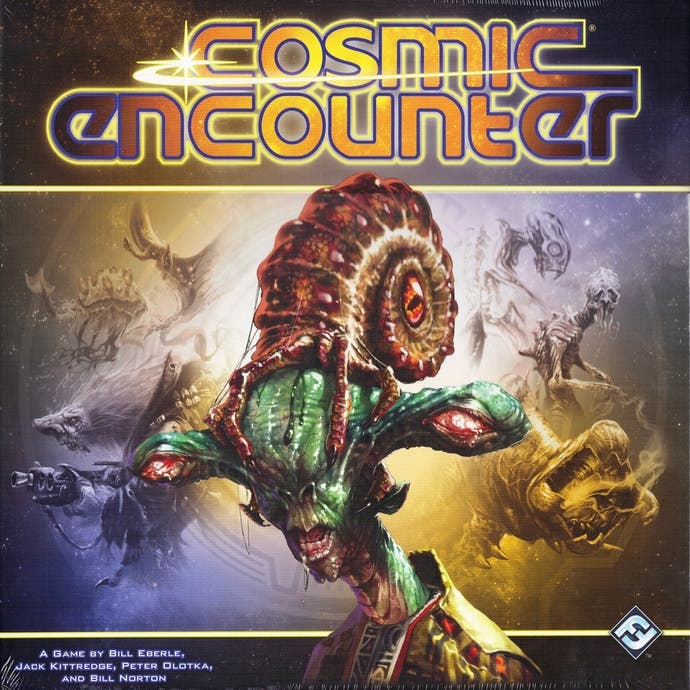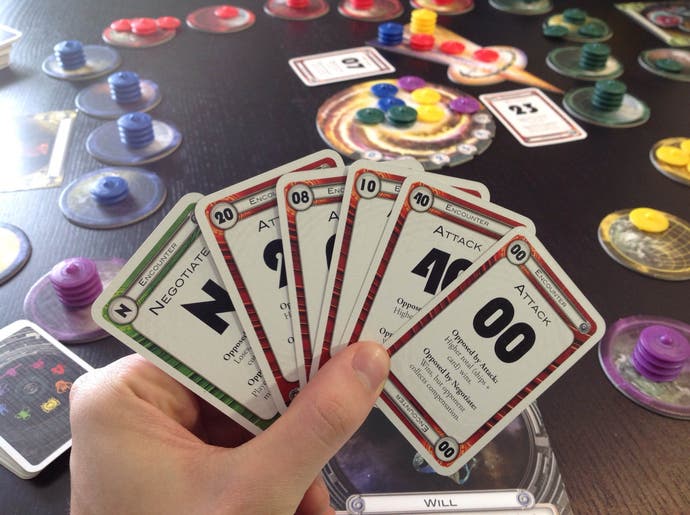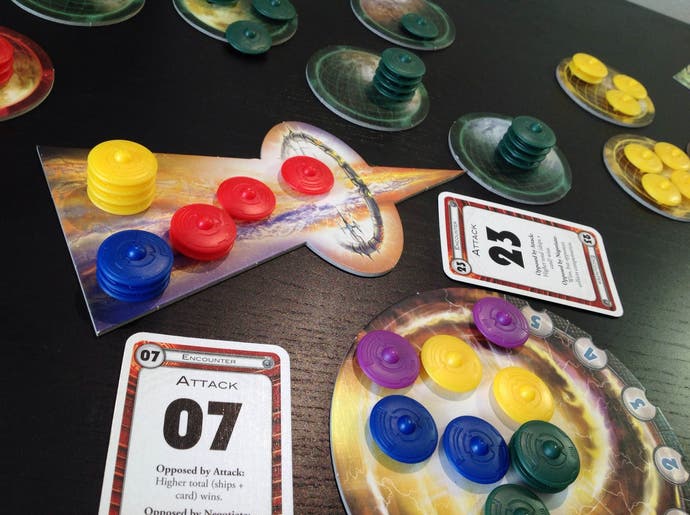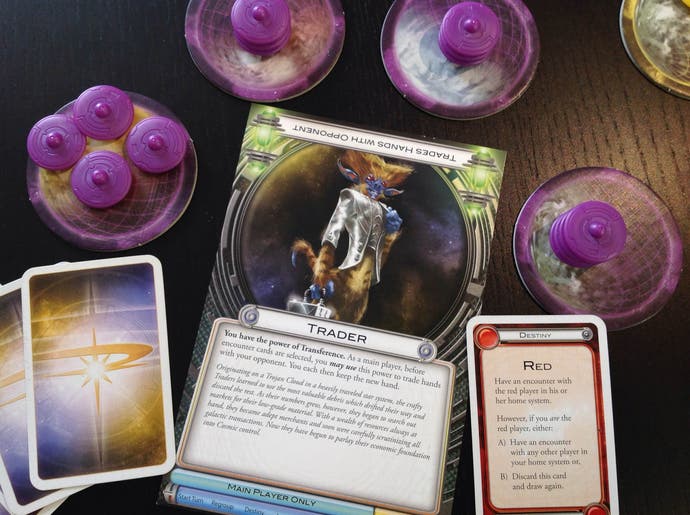Cosmic Encounter review
Great fun with the original space oddity.

Price: £40 / Players: 3-5 / Time: 60 minutes
A while back, I called Pandemic the perfect box to start your board game collection. It's an accessible game full of drama, elation and delicious-looking translucent cubes that roundly judo-chops most preconceptions about table games by being quick, exciting and co-operative.
Now, let's talk about the second game you should get. Cosmic Encounter is, according to those in the industry capable of shouting loudest, the best board game in existence today.
I want you to imagine poker. It's not untrue to call poker a perfect game. It's also not untrue to call it occasionally boring and exhausting, and to disapprove of its chapped mathematical underbelly.
Now, imagine if poker was made for gamers. Imagine if it was wildly inventive, with a mean streak and a wicked sense of humour. Best of all, imagine if it was a different, surprising game every single time you sat down to play. Or don't imagine, and pay £40 for this set of linen-finished cards, plastic UFOs that stack like poker chips and gorgeously illustrated aliens. Odds are, you'll be very glad you did.
In Cosmic Encounter, each player controls one alien race from a fat pack of 50, with the aim of spreading their greasy people to other players' home planets. Technically, you'll do this by having "encounters" with other players, but more practically, you'll do it by playing your cards right, talking and lying. This is the steely core of Cosmic Encounter:

Everybody gets a hand of these numbered attack cards, and perhaps a few "negotiate" cards. On your turn, you draw a card to see which alien (player) you're having an encounter with. You select how many ships you'll send to invade and invite other players to join you (if you like), and the defending player can then invite players to help them.
Finally, you both play one of these cards face-down, then simultaneously flip them over, adding the number of ships on your side to the number on the card. The highest total wins, and every single ship on the losing side is destroyed - unless you both agreed to negotiate, like space-adults, and played negotiate cards, at which point players can create foreign colonies without bloodshed. But if a negotiate is opposed by an attack, the attack automatically wins. Winning attackers get a colony on the opposing player's planet. Fastest to five foreign colonies wins.
There's only one other rule that I should stress. You only get a new hand of cards when you've played every one of your own. Which is why, when a friend of yours messages you from across town with a photo of seven negotiate cards and one attack of strength 04, you burst out laughing.
In general, though, think about this as a puzzle. If you have a dozen more ships than your opponent in the encounter, you might assume they will assume that they've lost, and they'll use this as an opportunity to get rid of a crap card. That means you, too, can play a terrible card. Unless they know that and play a good card - and suddenly you're telescoping deep into your friends' minds. Minds which might contain strategies like inviting every other player to join them in glorious attack, then using that as an opportunity to ditch the lowest card from their hand and killing off their "allies" in something a bit like Game of Thrones writ small.
But if this is the skeleton of Cosmic Encounter, let's talk about the heart, the thing that turns it from a passable game into an astonishing one: the 50 different aliens in the box and the 20 more that come in each expansion pack. No matter who you are - whether you're the disgusting Filth, the terrifying Parasite, or the comedic Animal ("You have the power to party!") - you're essentially given the chance to break, twist or replace one of the game's rules.

That can be as simple as the Loser, who wins if he loses and loses if he wins, or the Prophet, who can gamble on who wins encounters to get a free colony. They might be funny, like the Remora, who can always invite themselves as an ally, or insane, like the Insane, who can ally against themselves.
Or maybe you draw something more luscious. The Saboteur can rig their own planets with bombs, while the Citadel can build impossible fortifications using their spare attack cards. The Fury gets angrier for every ship they lose, while the Genius can take a handful of extra cards instead of getting a foreign colony, winning if they have a bulging hand of 20 cards.
I could go on. In fact, I will. The Leviathan can send their own planets into battle. Tick-Tock turns a player into an ominous clock who automatically wins if he can stall the game for long enough. The Filch can literally just cheat and gets a free pass if they're found out. It's astonishing how much the designers have been able to dream up and it's just such a playful, fascinating feature for a game to offer.
Because don't forget, despite that deep space setting, these aliens don't exist in a vacuum. They interact with one another in bizarre ways, as do their owners, because this is still a game of negotiation. A game of laughable galactic summits where you try and convince people you all really need to do something about the Warp, who's getting more powerful for every ship that's destroyed, while the Masochist sits by giggling, because they can win if they lose all their ships.
The result? Every game of Cosmic Encounter is utterly unique; every slimy array of randomised alien races and still silmier players is a ludological snowflake. But more than that, each game of Cosmic Encounter is a story, casting a selection of aliens into a terrific ball pit of cards and lies and seeing who surfaces victorious. Above, I described the Loser as quite simple, but I remember one game where the Loser did battle with the Anti-Matter, who makes the lower total on each side... win.

But perhaps what's most interesting is that for all of Cosmic Encounter's brilliance, both abstract and physical (gotta love pointing the warp gate and clicking your ships onto it), it has no intention of being a fair and balanced challenge. So much of the joy of the aliens is that they aren't balanced. And that's just fine, because being a table game, Cosmic Encounter simply allows player to talk.
"Balance" is all in the eye of the beholder, anyway, and arguably more important than your alien or your skill with cards is your knack for participating in the world's weirdest model UN. It's about scrabbling for order out of chaos. It's also about hubris and your own failings, where the damage to someone's ego from being attacked when they played a negotiate could be a hammer blow that breaks the galaxy's back, allowing the monstrously overpowered Virus to sweep everyone's solar systems as your friends collapse into infighting.
The end result is a game with effortlessly entertaining card play, intense negotiation and laugh-out-loud funny occurrences every five minutes, where no two games will ever play out the same way. A game which is perfect right out of the box - and so the expansion boxes, in addition to adding aliens, simply act as tiny mod-kits for when you need them. Large group? Cosmic Alliance can make it a team game. Playing with your gamer friends? Cosmic Storm adds a set of space stations, each with their own effect, than can be traded and conquered. Want something even sillier? Cosmic Conflict offers the ludicrous Hazard Deck, which randomly lobs Cosmic Quakes and interdimensional horrors into the proceedings.
But don't just take my word for how good Cosmic Encounter is. Board games are forever falling out of print. This one? Originally published in 1977, it's currently on its eighth edition and the sales are stronger than ever. I'd tell you to order it just to own a piece of gaming history, but that wouldn't be right. I couldn't be less fussy about my copy of Cosmic. I've been breaking it out for years, the cards are blackening around the edges, the nose of my warp gate has been bludgeoned and lost its point.
Buy Cosmic Encounter and fill the box with your own history. That's the smart play here.
Quintin is the editor of Shut Up & Sit Down, a board game review site. Visit it for more coverage of this strange cardboard realm.









